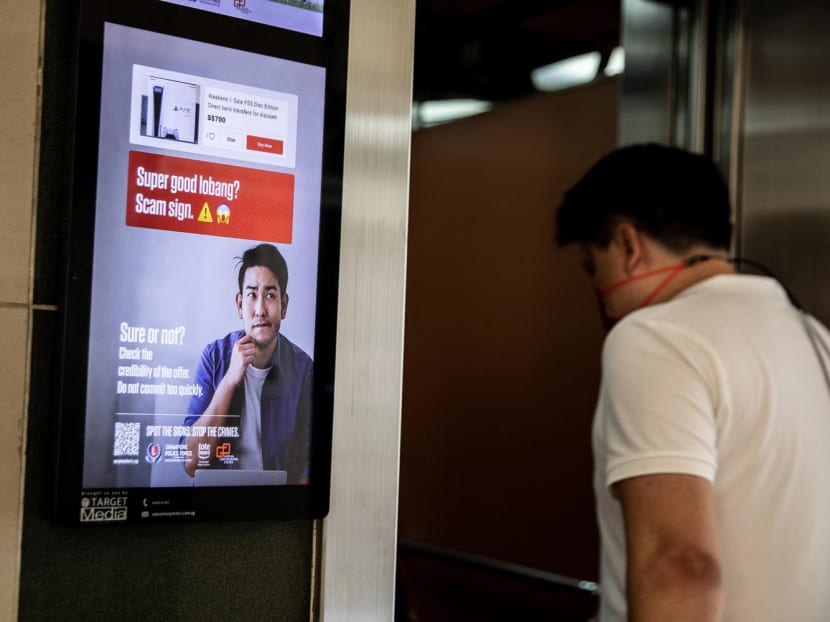Bill allowing early action to thwart scams, voyeurism, phishing and other online crimes tabled in Parliament
SINGAPORE — Early action could be taken to stop malicious online crimes such as scams, phishing and voyeurism even before they can occur, if a new Bill tabled in Parliament on Monday (May 8) is passed.

An anti-scam poster at an HDB void deck.
- A new Bill allowing the authorities to act early against suspected online crimes was tabled in Parliament on Monday (May 8)
- The Online Criminal Harms Bill covers a wide range of cybercrimes, including scams, sexual offences, terrorism activities, and offences that cause racial and religious disharmony
- The Bill will enable the Government to issue directions to any online service where criminal activities could be conducted or are suspected to occur
- This lowers the threshold for taking action, as the Government can issue directives even before a scam or crime can occur
- It will also require online services to implement codes of practice that will support enforcement actions
SINGAPORE — Early action could be taken to stop malicious online crimes such as scams, phishing and voyeurism even before they can occur, if a new Bill tabled in Parliament on Monday (May 8) is passed.
The new Online Criminal Harms Bill is aimed at lowering the legal threshold for the authorities to act against those who commit or abet online crimes, including by compelling platforms such as messaging apps to block criminal activity before people fall victim.
It will enable the Government to issue directions to any online service where criminal activities could be conducted if there is "reasonable suspicion" of a cybercrime.
The proposed Bill covers a wide range of cybercrimes, including online scams and unlawful gambling, terrorism activities, and offences that cause racial and religious disharmony, or incite violence or disobedience to the law, the Ministry of Home Affairs (MHA) said in a press release.
It will also cover sexual offences that are facilitated online, such as the distribution of voyeuristic and intimate images without consent.
This comes amid an increase in such crimes in recent years, despite a suite of recently amended or introduced laws to protect the public from various online harms.
Last year, the number of scams and cybercrime cases reported went up to 33,669, a 25.2 per cent jump from the figure in 2021, said MHA.
The number of phishing attempts also more than doubled in 2022, with about 3,100 attempts reported in 2021 and around 8,500 last year.
DIRECTIONS CAN BE ISSUED TO ONLINE SERVICES
The authorities may issue five types of directions to stop cybercrime in its tracks:
- A stop communication direction may be issued requiring the online service to stop communicating a specific online content to users in Singapore
- A direction to disable the specified online content from the view of Singapore users, including identical copies of the content
- A direction to restrict errant accounts on the online services that will stop communication and interaction between users in Singapore and the accounts
- An access blocking direction may be issued, which requires the online service provider to block access to an online platform from the view of people in Singapore
- A direction to remove the entire app from app stores may be issued, which stops further downloads of the app by people in Singapore
Under the Bill, online services will also have to adhere to a set of baseline standards under a code of practice, which may differ depending on the nature of the service.
The codes of practice require online services to implement systems and measures that enable partnerships with the Government to prevent scams and support the Government’s enforcement actions against such crimes.
The move comes after a series of laws aimed at protecting users from online harms were passed in recent years, including the Protection from Online Falsehoods and Manipulation Act (Pofma) in 2019, the Foreign Interference (Countermeasures) Act (Fica) in 2021, the recently amended Broadcasting Act and the Online Safety (Miscellaneous Amendments) Act.
The new Bill differs from previous legislation by specifically targeting online harms that are criminal in nature, and allows the Government to proactively disrupt scams and malicious cyber activities.
This differs from the target of preceding legislation, such as Pofma, which targets fake news, and Fica, which targets foreign interference via local proxies.
Meanwhile, the Online Safety (Miscellaneous Amendments) Act, which was passed last year, gives the Infocomm Media Development Authority the power to issue directions to online communication services that carry harmful online content, such as sexual violence and terrorism.
These directions could include disabling access by Singapore users to such harmful content or blocking their access to such platforms.
The Online Safety (Miscellaneous Amendments) Act also requires social media services to implement measures on their platforms to reduce the risks of Singapore users' exposure to harmful content online.
The Broadcasting Act was also updated to regulate online communication services accessible in Singapore, which can be provided from within or outside the country.
HOW THE BILL WILL WORK
If passed, the Bill will allow the Government, or the relevant authority which is the Singapore Police Force (SPF), to restrict errant accounts on specific online services.
For example, if an online criminal activity, such as a drugs transaction, occurs on a messaging app, the Government can assess whether the activity is clearly criminal in nature.
If it is assessed to be a crime, SPF can issue a direction to the online service to restrict the errant user’s account on the messaging platform.
The messaging platform will then have to comply and restrict the relevant accounts from interacting with Singapore persons.
The Bill will also allow the Government to take proactive action in disrupting online scams if an online service is even suspected to be used for scams or malicious cyber activities.
This lowers the threshold for taking action as the Government can issue directives even before a scam or crime can occur.
For example, if accounts on online services are suspected to be set up to facilitate scams due to tell-tale indicators, the online service may be issued a direction to restrict the suspected accounts from interacting with potential customers.
Such tell-tale indicators include the account being set up recently or providing contact information that was provided in other reported scams.
This allows the scams to be disrupted early before they can harm potential victims.
CODES OF PRACTICE FOR ONLINE SERVICES
The Bill also requires codes of practice to be issued to online services to enable close collaboration between them and the Government.
These will require online services to implement measures that support and allow close partnerships with the Government, and prevent scams and malicious activities on their platforms.
The codes of practice may differ for each online service, depending on the nature of their platform.
Such practices could include providing protection mechanisms for online payments, sharing information with the police on suspected scam or malicious cyber activities, or facilitating criminal investigation into such activities.
However, if the risk of scams and online crimes continues to persist on the online service despite the implementation of the codes of practice, SPF may issue a directive to these online services.
The directive will require online platforms to implement any of the five specific measures to reduce the risks of such online crimes.











